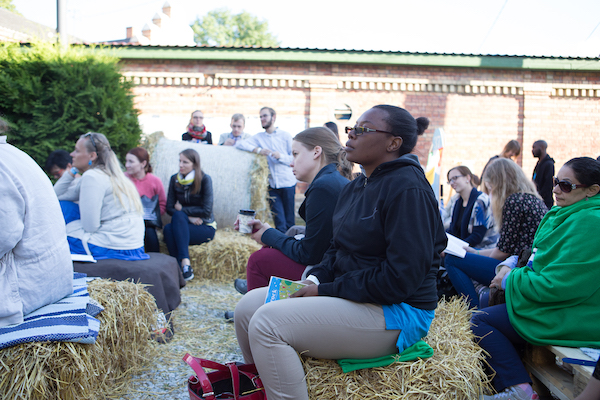
Photo: Kärt Vajakas
There are moments when debate feels like luxury. Nowhere did this seem to be more the case than when sat on a bunch of haystacks-turned-sofas in the afternoon sun in Paide, listening to a discussion on motherhood across the world. Considering that in many countries there is still little choice or discussion about whether to be or not be a mother, the NGO Mondo-organised panel felt almost outer-worldly.
Why is motherhood, experienced by nearly half of the world’s population at some point in their lives, still a contested issue? How do concepts of maternity differ from culture to culture? Could a globally-minded approach to motherhood be key to solving other global development issues?
The debate, entitled “Motherhood: a burden or a privilege?”, saw speakers from Afganistan, Finland, Somalia and Norway try to crack how to make motherhood a more fulfilling experience across cultures.
While there were no Estonian speakers in the panel, it felt highly timely to listen to a debate on motherhood at a time when the Estonian Ministry of Social Affairs is proposing an elongated parenthood leave, stretching the current period of 1,5 years to 3 years. This is a world removed from the discussion’s opening remarks by Zahra Akbari, an Afghan midwife now living in Estonia. Akbari, who has delivered 6000 babies into the world, noted that in a country torn by war and conflict, any desire to become a mother is always shaded by the constant fear for safety. In such an unstable environment, questions of family planning simply cannot exist in a way similar to the Nordics or even Estonia.
The above thought was later built upon by Wali Hashi, a Finnish-Somalian journalist, suggesting that differences in political and economic system of a country determine motherhood more than any specific cultural beliefs. Even so, cultural relativity must remain part of the discussion in global development goals around motherhood. As noted by Gro Lindstad, heading the Norway-based FOKUS (Forum for Women and Development), actions to ensure sexual reproduction rights on a global scale are tied up with post-colonialism and can face lash-back if Western values are imposed too rigidly.
Increasing women’s economic self-sufficiency is at the heart of giving women the choice to become, or not to become, mothers. The panelists scrutinised the Bangladesh micro-loan example which has allowed more women to make their own living. As a result, fertility figures in the country, once among the highest in the world, have dropped rapidly. Could a social innovation scheme across developing economies be part of a solution?
It is easy to invent master plans for world peace and equality, but implementation can be tricky. Tapping into the problematic of global ambitions and local realities, I was struck by one question by an audience member: ”How to develop a global solution rather than localised solutions?”. For Lindstad, this is something addressed in the UN’s seven new sustainable development goals. Rather than placing responsibility on certain developed economies, tainted by the spectre of post-colonialism, Lindstad opined the new goals mean that “all of us are accountable.” As for an integrated solution, comprehensive sexual education across cultures could be the answer.
Yet, as with any debate, and particularly with global development, there are no easy answers. Zainab Homam from the London-based organisation Afghan Action stressed the difficulty of bringing sexual education to her country of origin Afganistan, which could take many years before it is publicly accepted. Instead, she suggested that the emphasis should be on individual parents, rather than state or global organisations, who can teach their children about reproduction in accordance with social mores.
But there is a global medium already shaping understandings about motherhood: social media. An increasing part of the global population now has access to mobile phones, and this number is only set to rise, particularly across developing economies. Is this what will make motherhood into a more uniform experience globally? While I ultimately remain sceptical on whether social media is the saving grace, it may indeed alleviate some of the issues around cross-cultural sexual education. Thinking about motherhood on a prickly haystack in Paide was great, but we need new versatile mediums to truly make this into a global conversation.
The panel was sponsored by the Nordic Embassies in Estonia.
